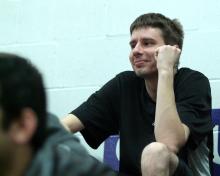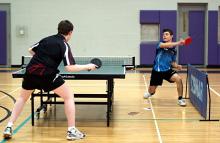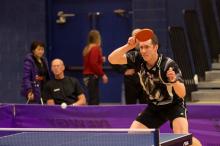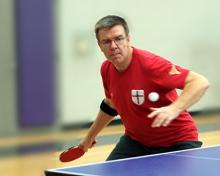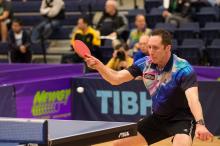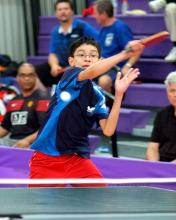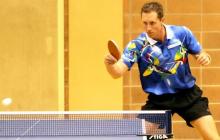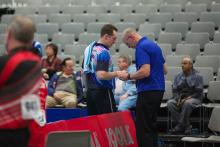by Samson Dubina on Mon, 2014-04-07 08:18
There are 3 things that you can control
Here are some of the attacks against your commitments; pressure thoughts about needing to win or fearing to lose, awareness of others’ expectations, other competitors’ gamesmanship, injuries, nets and edges, poor lighting and slick floors. None of the issues would matter as much to you if you weren’t striving to be something greater. However the higher your table tennis game elevates, the greater the potential for distractions that can suck the commitment right out of you like a mental game undertow.
by Samson Dubina on Sat, 2014-03-29 06:37
Four Tips to Mental Victory in Duece Games!
In an average tournament, you might have around 20 games that are 9-9 or 10-10. Your success or failure during the tournament largely rests on winning those games. I have a few tips that will help you better win those important sets.
#1 Enjoy them! You probably enjoy the rush from other things in life like roller coasters, scary movies, caffine, and other things. If you feel a bit excited in a close game and your heart is pounding a bit harder, learn to enjoy it! Enjoying those close games with a smile will help you to relax and play your best!
by Samson Dubina on Tue, 2014-03-25 07:14
Principle #1 your mind can only concentrate on one thing at a time.
(Action Statement for principle #1) I take control of what I picture, choosing to think about what I want to create in my life.
Principle #2 what you say is not important. What you cause yourself or others to picture is crucial.
by Samson Dubina on Mon, 2014-03-24 05:38
Should I be thinking about the outcome or execution?
Article Written by Carl Hardin
Anxiety is a natural part of competing because we tend to worry about the outcome of a match and what’s going to happen in the future. We have no control over the outcome but we can control our execution. When you start to think about what’s going to happen, redirect your thinking to your breathing, this will keep your mind away from “the what if”.
by Samson Dubina on Thu, 2014-03-20 00:45
Learn to play "IN THE ZONE"
by Samson Dubina on Sat, 2014-03-15 08:39
There are 2 frequently asked questions that I would like to answer in this blog posting…
Question #1
Bob, “Samson, why do I often play much better in tournaments against players would are rated 200 points higher that I am. It seems like I play better against better players.”
Question #2
Betty, “Samson, why do I often play very poorly against better players. I just can’t seem to get into my normal routine.”
Hi Bob!
by Samson Dubina on Mon, 2014-03-03 08:33
Samson offers some advice on what to do when you find yourself losing a big game
I am playing a very important match in a tournament; I am losing 2-0 in games and now losing 5-0 in the third game. What should I do?
The first thing is… Never give up! I have won many matches because of a third-game comeback. My opponent starts crying to himself that he should have finished the match and the momentum swings to me.
The second thing is… Call time out. A friend or coach might be able to give me tips, insights, or encouragement which could really help.
by Samson Dubina on Tue, 2014-02-18 19:51
If you are a tournament player, shaking off a loss will be one of the biggest hurdles that you need to jump. This entire article can be summed up in 1 sentence…
Stop the excuses, admit you lost.
After admitting to yourself that you lost that match and it was your fault, you will then be able to clearly think why you lost and you will learn from your mistakes. If you continue to make excuses, then you won’t change, you won’t improve, and you will keep losing.
by Samson Dubina on Tue, 2014-02-18 19:46
Learn How to Become a World Class Player!
Question: Samson, how can I improve my mental game?
Answer: Choose a level-headed, world-class player and copy him.
When studying this elite athlete there are several things that you should be looking for.
Attitude During Training
by Samson Dubina on Wed, 2014-02-12 12:05
You have often heard the Marines say, “Earned, never given!”
This is the same mindset and you should have in table tennis.
When you serve a fast, surprise serve, you are planning for your opponent to return and you are planning to win the rally.
When you loop with your powerful forehand, you are expecting your opponent to return it and you are expecting to loop multiple balls in order to win the rally.
When you push deep and fast to your opponent’s wide forehand, you are expecting a soft opening that you can counterloop.
Pages




